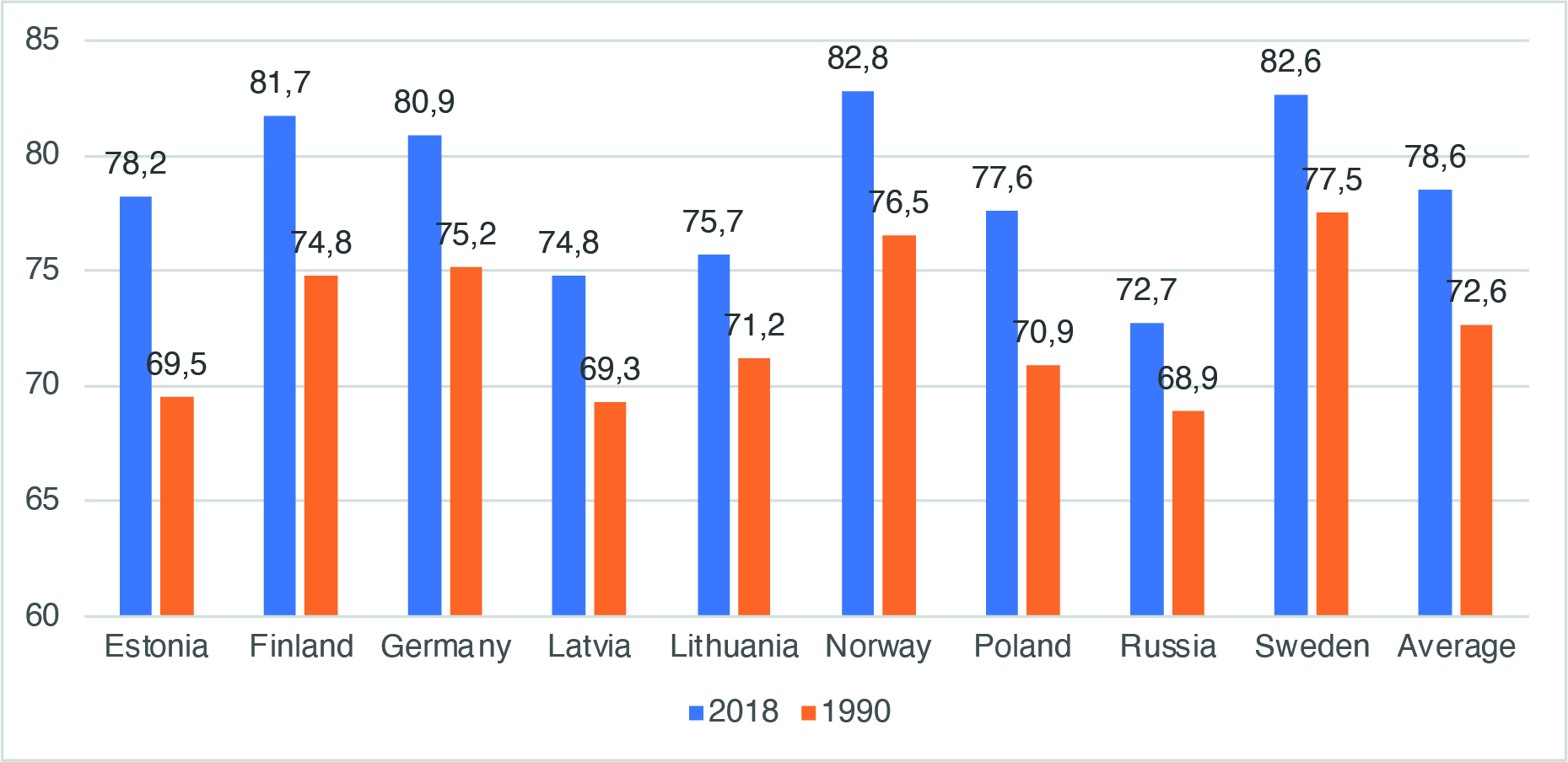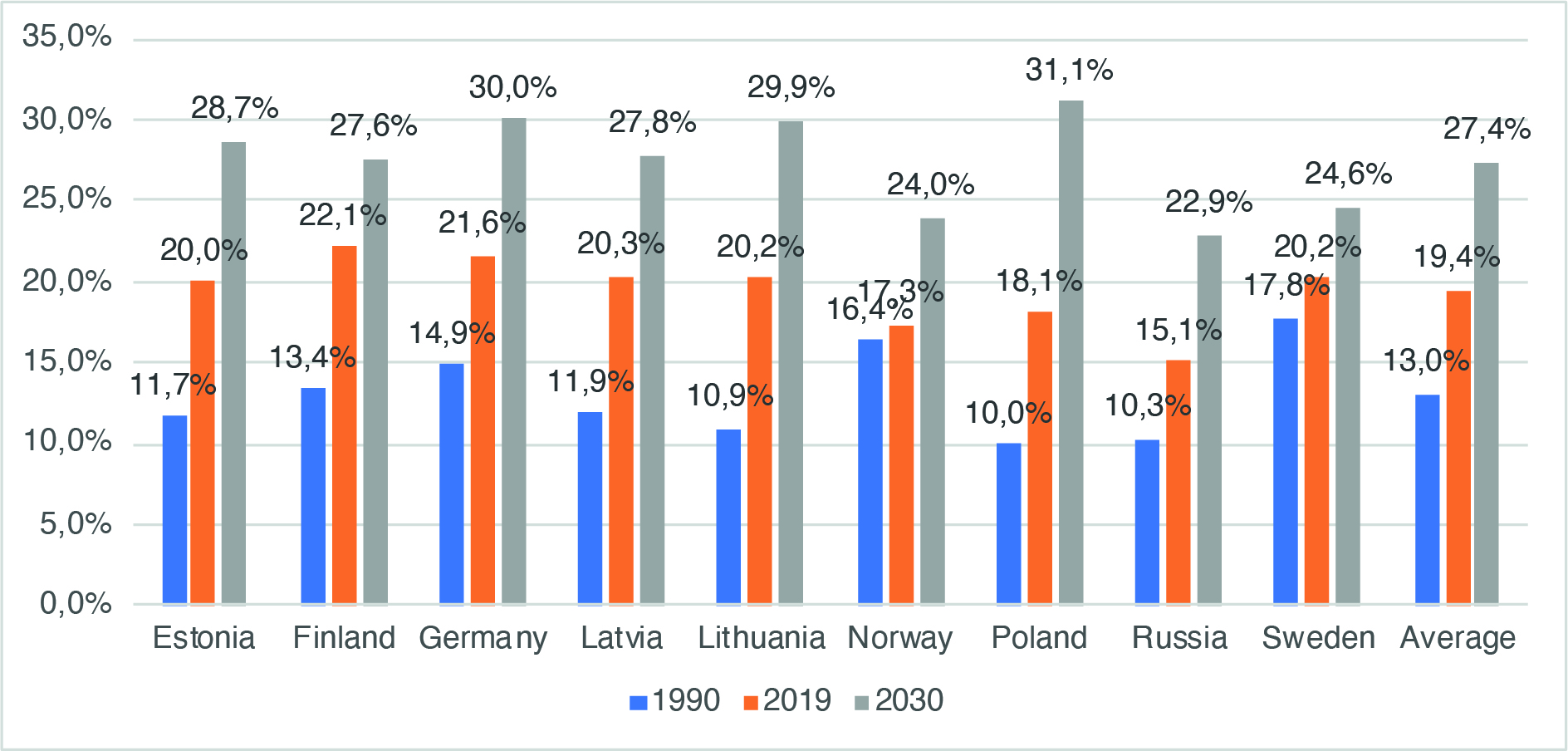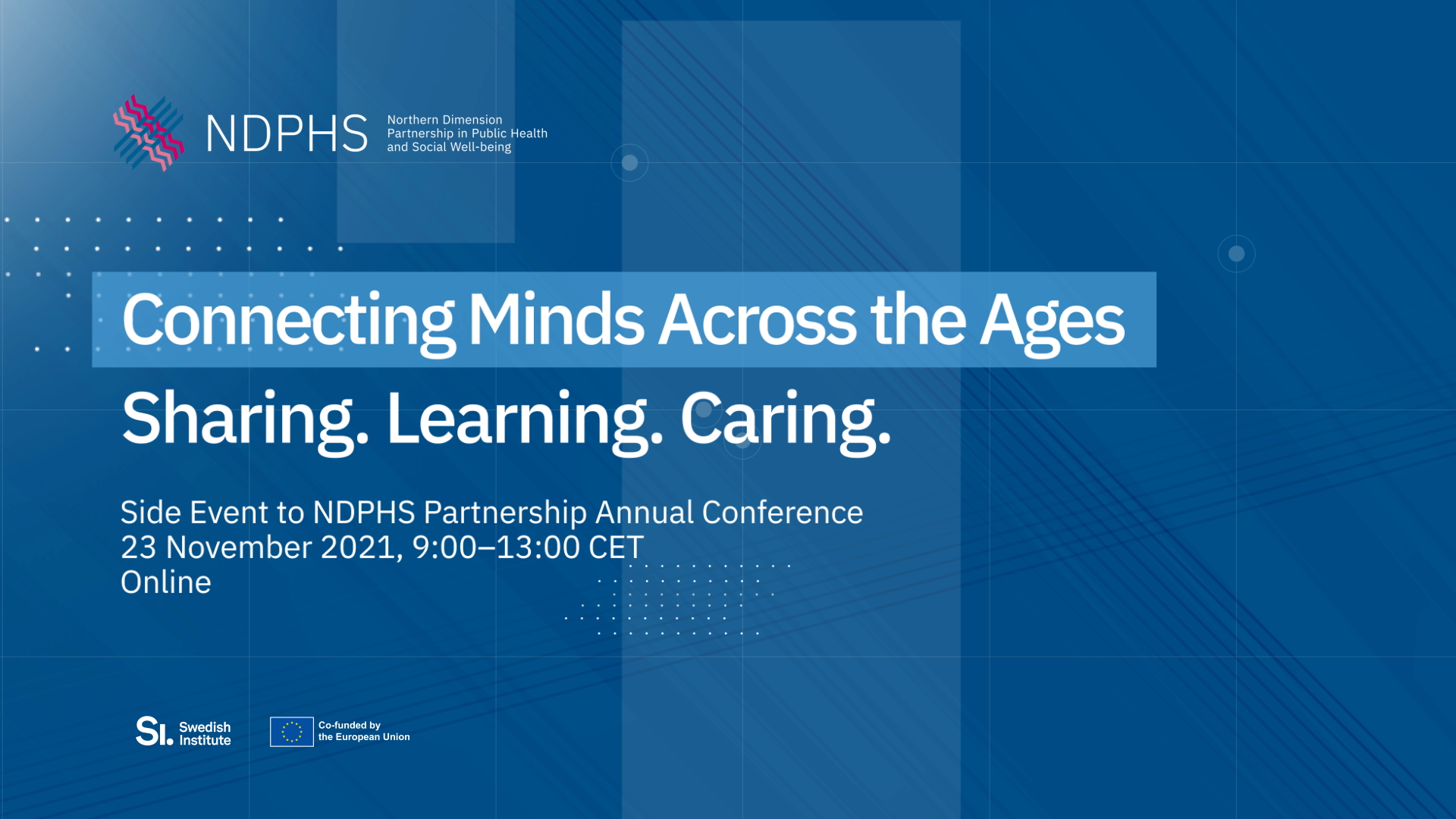Roadmap to improve the health and wellbeing of the ageing populations (AgeFLAG)
The AgeFLAG seed money project funded by the Swedish Institute and the German Ministry of Health focused on challenges and needs of the ageing populations in the Baltic Sea Region. The topic of active and healthy ageing is more important today than ever before. Approximately a fifth of the population in Northern Europe and the Baltic Sea Region is aged 65 and over. Maximising the healthy years for all into old age is a cornerstone to prosperous and flourishing societies.
The aim of the AgeFLAG -project was to contribute to the health and wellbeing of older adults and to make our societies inclusive. With over 200 individuals from the Baltic Sea Region contributing, we held seven national needs assessments, identified four regional priority areas for further action, and generated numerous creative ideas for transnational activities. The roadmap produced through this process presents the first steps towards establishing the NDPHS as a thought leader on healthy ageing.
The life expectancy rate is increasing throughout the world, also in the Northern Dimension area. According to the World Bank data, the life expectancy rate at birth, which estimates the number of years a new-born would be expected to live if the mortality patterns at the time of birth would remain constant throughout life, was 72,6 years on average in the region (including Germany and Norway) in 1990.
As of 2018, the life expectancy at birth has increased by six years, standing at 78,6 years, indicating that people are generally living significantly longer than only 30 years ago.

Simultaneously, the share of older adults in the population and the older age dependency ratio is increasing, indicating an ageing population. According to the World Bank data from 2019, on average almost a fifth (19,4%) of the population in each country of the Northern Dimension area was aged 65 and above. This share has rapidly increased since 1990 when old adults made up 13,0% of the population in the region. With the old age dependency ratio standing at 30,3%, for every two working-aged people, there currently is roughly one dependent older adult. The population has, thus, aged in the past 30 years. This trend is also expected to continue in the near future.
It is prospected that, in 2030, 27,4% of the population in the region are aged 65 or older and that, with the old age dependency ratio at 51,5%, for every one working-aged person there is one dependent older adult.
Therefore, the region is currently experiencing a significant societal and demographic transformation. The rapid increase in the share of older adults aged 65 and above is demonstrated below.

According to the most recent data retrieved from the Global Health Observatory, people aged 60 still have 22,6 years ahead of them with 17,2 of them in “full health” on average. This corresponds to 5,4 years lived with some form of morbidity or disability at an old age. A well-functioning health care and social system that is prepared to meet the complex needs of older adults is a cornerstone for an appropriate response to the ageing society.
With this demographic change in mind, this project seeked to identify the most acute regional needs regarding healthy ageing and to prepare for a joint future activity for improving the health and wellbeing of older adults in the Northern Dimension area.

In the context of active and healthy ageing on November 23 2021, the NDPHS Secretariat organized an online conference “Connecting minds across the ages”. During the conference, the NDPHS Manifesto was presented and together with policy makers and civil society representatives from across the region, two central themes were discussed:
- Combating ageism: transforming public attitudes and addressing ageism in healthcare and at the workplace. We will explore how and why people feel, think and act on ageing and how to switch mindsets to more open modes. A person-centred approach is the key, everyone’s contribution to society shall be recognized and no person should be treated as an invisible particle of a homogenous group. How do we systematically recognize potential inequalities and blind spots and address them?
- Connecting ages: promoting intergenerational contacts and inclusivity of older people in service design and policymaking. We will discuss how to fundamentally and systematically revise the modes of thinking to step out of silos towards a co-creation that is inclusive across sectors and society and engages nontraditional partners. New developments such as digitalization of health and social care shall not lead to more inequalities and must be co-designed with all users, making extra effort to empower and involve people from marginalized and vulnerable groups in a meaningful way.
Flagship Background
Active and healthy ageing is a cross-cutting theme that touches upon all of the Partnership’s focus areas. Considering this wide relevance to the work of nearly all of the Expert Groups, there was a call for horizontal action that tackle the challenges of the ageing population. In 2018, several planning workshops were carried out using the logic framework approach for the development of project ideas for this horizontal action. The AgeFLAG seeks to identify the most important issues in relation to active and healthy ageing that countries in the region are facing.
The project partners in Estonia, Finland, Latvia, Lithuania, Poland, Russia and Sweden organised national needs assessments in 2020. The consortium of partners was formed from regional stakeholders with a mandate to work with policies surrounding the topic of ageing. They expressed strong interest as well as demonstrated capacity in contributing to the development of the Roadmap for a Flagship project on active and healthy ageing.
The WHO defines Healthy Ageing “as the process of developing and maintaining the functional ability that enables wellbeing in older age”.
Functional ability refers to the capabilities that allow people to be and do the things they value, for example, meeting basic needs, learning, growing and making decisions, being mobile, building and maintaining relationships, and contributing to society.
According to the WHO, “functional ability is made up of the intrinsic capacity of the individual, relevant environmental characteristics and the interaction between them”. Intrinsic capacity refers to mental and physical capacities that are essential for basic functions, such as walking, talking, seeing and remembering. The presence of diseases, injuries and age-related changes may compromise the level of intrinsic capacity. In addition to the intrinsic capacity, the surrounding environments, including home, community and broader society, and all factors within them, such as the physical aspects of space, people and their relationships, attitudes and values, health and social policies, the systems that support them and the services implemented, influence functional capacity. An environment that supports intrinsic capacity and functional ability is essential for healthy ageing.
- Full name: Roadmap to improve health and wellbeing of ageing populations in the Baltic Sea Region (AgeFLAG)
- Start date: 1 September 2019
- End date: 31 November 2021
- Financing agencies: Swedish Institute and the German Ministry of Health
- Budget: SEK 500,000 (Swedish Institute) and EUR 20,000 (German Ministry of Health)
- Lead partner: NDPHS Secretariat
- Project partners:
- The Estonian Institute of Population Studies (EE)
- A research and training institute in the Tallinn University. Ageing is one of the key areas of the Institute’s demography research. The mission of the Institute is to monitor, analyse and project the existing and emerging trends that shape the ageing society. Since 2010, the Institute has been conducting the Survey of Health, Ageing and Retirement (SHARE) among people aged 50 or older in Estonia. The Estonian Institute for Population Studies also contributes to the ongoing project The Development of advocacy capacity among institutions and organisations targeted to older people commissioned by the Estonian Ministry of Social Affairs. The Institute is the only academic institution in Estonia that has developed a training course for Educational Gerontology. Ageism and active ageing are one of the focus points of this course.
- Rīga Stradinš University (LV)
- A leading academic research institution in the fields of medicine, pharmacy, dentistry, rehabilitation and nursing sciences. It is among the largest education institutions in the Baltic States in medicine and health sciences. The basis of the RSU research activity is the concentration of resources for the purpose of conducting outstanding, up-to-date, comprehensive and implementable scientific research that is consistent with the contemporary public needs. In its operations, RSU devotes particular attention to the integration of framework, pre-clinical and clinical research and linkages thereof to public health indicators. Research at RSU is organised in three platforms of which one is dedicated to public health. The Public Health Platform provides qualitative research to facilitate health promotion, health care organisation and the improvement of the occupational health and safety in Latvia. Population ageing is an aspect that is often encountered in this research.
- Lithuanian University of Health Sciences (LT)
- The largest institution of higher education for biomedical sciences in Lithuania with almost 100 years of academic experience and great potential for development. It is one of the leading universities in the region in the fields of training health professionals and postgraduate education. LSMU is a member of the World Health Organisation, where it fulfils the role of a collaboration centre for research and training in epidemiology as well as for prevention of cardiovascular and other chronic non-communicable diseases.The Faculty of Public Health at LSMU is actively involved in public health research.The Faculty has worked on healthy and active ageing in numerous research activities and is well established in this field.
- National Institute of Geriatrics, Rheumatology and Rehabilitation (PL)
- Based in Warsaw, is a science and research institute as well as a medical service provider in Poland. It trains physicians and physiotherapists to become specialists in geriatrics, develops national standards of care and conducts research projects. The Institute also cooperates with NGOs and organises events and seminars to teach abouthealthy ageing. It is specialised in researching ageing processes as a part of the interdisciplinary science gerontology. The conducted studies focus on different fields, such as sociology, demography, psychology and medicine. Gerontological research at the Institute is conducted through the Gerontology and Public Health Department.
- National Board of Health and Welfare (SE)
- A government agency under the Ministry of Health and Social Affairs in Sweden that works to ensure good health, social welfare and social care on equal terms for the whole Swedish population. The activities concern social services, health and medical care, and communicable disease prevention. The Board produces and develops statistics, regulations and knowledge in a number of different areas, such as oncology, patient safety and eHealth. Moreover, it develops health and social care support for different groups in society, such as children, older adults and people with mental illnesses or disabilities. Based on the governing laws, the Board produces regulations and general advice on how to comply with the requirements of the regulations.
- Federal Research Institute for Health Organisation and Informatics (RU)
- The Ministry of Health of the Russian Federation carries out a wide range of activities from scientific research and training to health information and international cooperation. The main objective of the Institute is to conduct scientific research to support policymaking in the field of health system development and the implementation of the national health policy. The Institute carries out medical, demographic and socio-hygienic research on the health and reproduction of the population. Furthermore, it cooperates with local and international organisations to conduct joint research and experience exchange in the field of public health, and implements initiatives in the field of innovative patient-centred health and social care technologies for older adults with non-communicable diseases.
- National Institute for Health and Welfare (FI)
- An independent expert agency working under the Ministry of Social Affairs and Health of Finland. The Institute studies, monitors and develops measures to promote the wellbeing and health of the population in Finland as well as gathers and produces information based on research and registered data. It also provides expertise and solutions to support decision-making and serves various parties: the government, municipal and provincial level decision makers, actors in in the social welfare and health sector, organisations, the research community and the public. One of the tasks of the THL is to support the development of older people’s services and to assess, follow andstudy the implementation of these services.
- Northern Dimension Institute (FI)
- Praxis Centre for Policy Studies (EE)
- The Estonian Institute of Population Studies (EE)
